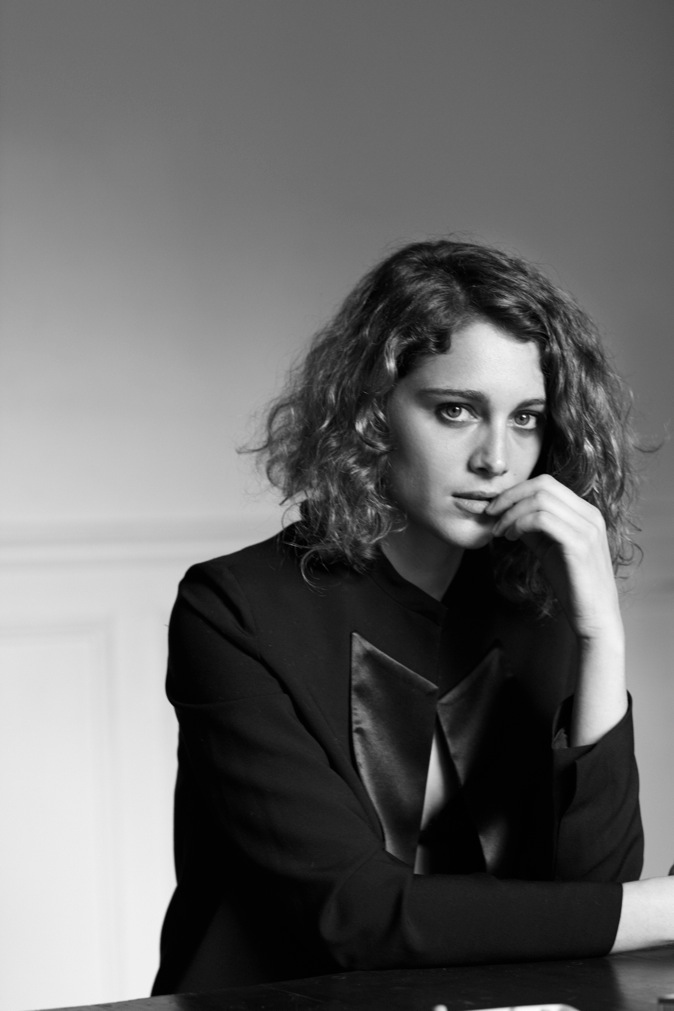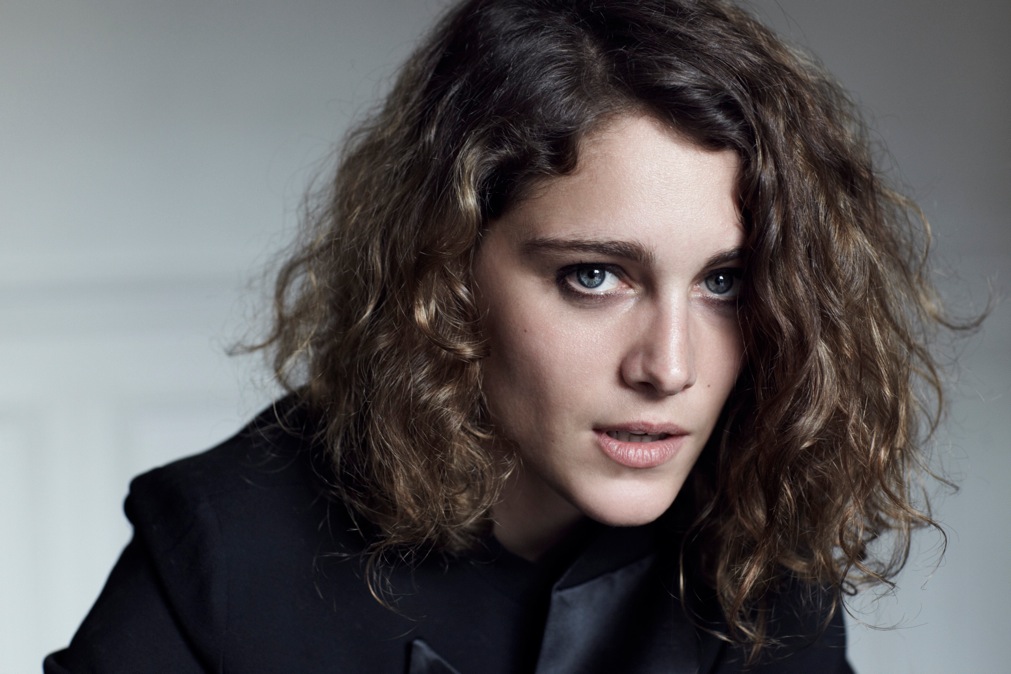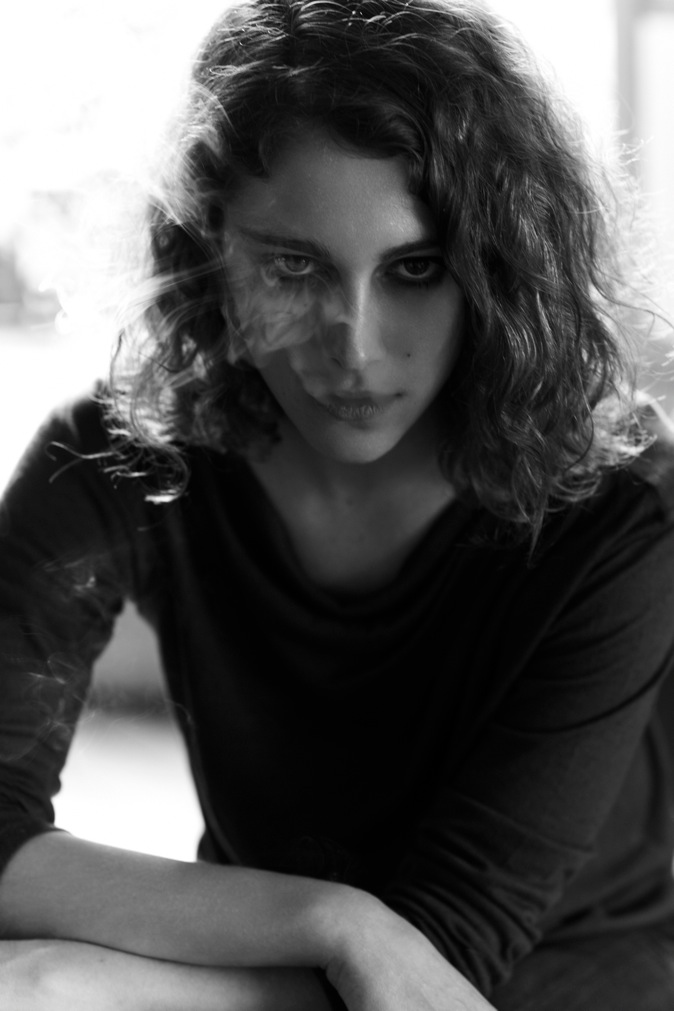-

ariane labed
-She’s French, but she acts in Greek.
ATTENBERG was her first film, but it won her a Lion at Venice in 2010 for Best Actress,
and the admiration of Quentin Tarantino and Sofia Coppola.
She loved the shooting, but hated the fame which followed.Introducing Ariane Labed in
ARIANE
an exclusive film by Justin Anderson,
in collaboration with THE STIMULEYE and Giorgio Armani,
and original pictures by René Habermacher.ARIANE, directed by Justin Anderson. Clothes - Giorgio Armani. Furniture - Armani Casa. Commissioned by THE STIMULEYE.
Antoine Asseraf : Bonjour!
Ariane Labed: Bonjour!
Are you currently in London ?
Yes, finally! I was supposed to move to London last September, but I’ve been moving around nonstop!
Do you often go back to Greece ?
I was in Greece in November to play with my troup VASISTAS, but now I’m more between Paris and London.
When did you first come to Greece, and what was your impression of the country at the time ?
I arrived in Greece 3 years ago, for a 9-month project of my troup with the National Theater of Athens, to put on a Faust.
I was born in Greece, lived there until I was 6, and I think I left part of my childhood there.I dreamt of returning. When I met Argyro Chioti in college, a Greek theater director with whom we created the troup VASISTAS, I jumped onto the opportunity of going.
So instead of 9 months, I stayed for 3 years, meeting Athina [Rachel Tsangari] and Yorgos [Lanthimos] had something to do with hit. Beyond a purely sentimental attachment to this country, I was impressed by all the artists I met and their urgent need to create. Without expectations of getting anything in return, beyond any judgement to which they could be subjected, beyond thinking about breaking even.
If I have just left, it’s only because I need to live in a country where I feel foreign, where I lose myself in the streets. That’s what I’m doing in London. The day where I won’t lose myself anymore, I will leave again.
But I will always return to Greece.
Ariane Labed by René Habermacher.
The films of Yorgos Lanthimos and Athina Rachel Tsangari in which you starred have universal resonance, but we can nevertheless imagine that they come in a context, in reaction to precise things happening in Greek society: the influence of the Orthodox church (the impossibility of cremation), the need to break the myth of Greece as a postcard-perfect location (the desolate landscapes of Attenberg)…
As you said yourself the Greek audience doesn’t really support these films, and when reading the article in THE GUARDIAN regarding New Greek Cinema I found the comments left by the Greeks to be very virulent – do you think the films play a role in questioning Greek society ?
If Greeks have a difficulties situating themselves in films such as Dogtooth or Attenberg, it may be because they carry a truth about their country which hurts.
This young generation carries with them the failure of the previous generation, a generation who thought they offering through a notion of “progress”, and after the military dictatorship, a better life, without taking into account the contradictions of orthodox culture and the desire for revenge after several centuries of hardship when the Greek people were a strange gate to the East.
Being French, I love all these contradictions about Greece, but that is also where the complexity lies, and these are facets which the new generation denies or which the previous cannot accept.
What I also love in Greece is that it’s non-colonial, as luckily they could never afford to be colonial, but it is painful to see and hear the Greek racism against the recent wave of immigration. I think the Greeks are overwhelmed by a lot of things today, and it’s evidently linked to the government which “enjoyed” European aid for decades, including the Olympics of 2004.
Though all this is probably only the beginning of what is slowly happening all over Europe.
ATTENBERG by Rachel Athina Tsangari - Trailer. Best Actress award at 2010 Venice International festival.
The beautiful thing about this chaos is that, these artists, without means, who expect nothing from the government, find the strength to meet and trust each other enought to creat together. That’s the case for HAOS, the production company created by Athina, which led to collaborations with Yorgos Lanthimos on DOGTOOTH and ALPS, and EMBROS, a new squat which just opened and brings together theater, danse, performance, critiques, writers, etc… Greek artists have never collaborated as much as they do today.
Of course the films of Athina [Rachel Tsangrai] and Yorgos [Lanthimos] carry and will continue to be denounced by a society which closes its eyes, much like other Western socities. That may be why they are recognized abroad but considered “weird” and barely tolerated in their home country. The taboos touched upon in Attenberg – death, cremation, incestuous desire, lesbian sexuality, are topics on which one can hardly have a dialog in Greece.
But it is difficult for me to criticize Greece… Beyond the corruption of the government and the misery into which it has dragged the people, which I can intellectually denounce, there remains for me an unspeakable element, a vibration I feel only there. A chaos which I find appeasing.
Ariane Labed by René Habermacher.
How did you live this experience of the “fashion film”, between actress and model, with Justin Anderson ?
I was quite reticent at first… but once I met Justin [Anderson] and he told me the concept, with the slow motion, I became quite excited. In the end it was a beautiful experience.
What are your current projects ? Can you tell me about your play with VASISTAS ?
The big news is that I’m about to shoot a film in France. The first film in my native tongue !
It took quite a while for people to figure out I’m French. My first 2 films, ATTENBERG and ALPS, are both in Greek, so everyone thought I was Greek. It doesn’t bother me at all, but really it’s quite a different exercise to play in a foreign tongue.
Congratulations. Are the plays with VASISTAS also in Greek ?
I’ve worked with my troup for 5 years now. We are 3 women: 1 Greek, 1 Mexican and myself. We met in college at Aix-en-Provence and created a troup. We work in different languages, centering on the body, on the impossibility of communicating with words. We don’t work from existing plays but rather from an editing of texts ranging from Deleuze to advertising… I play in French most of the time, but the text is there to relate to meaninglessness… My work is rather physical.
So it’s your own creations ?
Yes. The last show was called “spectacle” [“show”]. www.vas.eu.com
This impossibility to communicate is also an important theme in Attenberg, your character is very physical but has difficulties communicating with others —did your theater experience push the role in this direction or was it already thought out this way ?
The writing of Attenberg didn’t change much…but it wasn’t written for a foreigner, so maybe inadvertently we pushed this Marina towards another manner of communicating. Certainly, with Athina we didn’t want to approach the character psychologically. There’s always a great deal of physicality in my approach.
Ariane Labed by René Habermacher.
Where does this physicality come from, is it because you’ve practiced ballet, or did you practice ballet because it was in you ?
I did 10 years of classical ballet. I stopped when I was 16 because I could no longer stand the way the body was dealt with. It’s a strange contradiction, I was and remain persuaded that ballet is a sublime and fair form of expression, but I can’t deal with the instrumentalised body. In ALPS, I play the role of a competitive gymnast, it was a superb challenge to have to return to this physical condition, and yet a real nightmare !
So you keep this tension within you, between the habits of ballet, the need to express yourself physically, and the rejection of the classical dance system….
Yes, something like that.
When we spoke for the first time by email over a year ago, I wasn’t aware that you were at the time going through a “reaction”.
Reaction?
Reaction, or crisis, ou questioning ?
Was it the reaction to cinema ? to the success of Attenberg ? or to the rigors of a gymnast’s discipline ?
Yes, it was shortly after my award in Venice… I was lost. I did not know how to deal with anything — I didn’t expect and wasn’t prepared for such a level of display. I locked myself into work (the preparation of the role in ALPS) and fled the journalists. It took me a long time to realise that it could be a gift in my life.
That’s when I decided to get an agent in Paris to continue film-making. When I made Attenberg, I didn’t think I had a place on a screen. I’d loved the shooting, but I couldn’t picture myself fitting in. This award led me to hope I could continue, and now I only dream of shooting again.
Before Attenberg, was there something you found repulsive in cinema, or was it an attachment to the physicality of theater ?
I didn’t think you could find the intensity you have in front of the public. That moment when you lose the notion of time.
And paradoxically what troubled you after Attenberg was the intensity of the public scrutiny !
Being exposed in a work of art has nothing to do with being exposed as yourself holding a world cup trophy.
I can be naked, raw, give myself completely for a scene or a film, but to expose myself as Ariane Labed in the press is something I find completely uninteresting.
ALPS by Yorgos Lanthimos - trailer. Best Screenplay at 2011 Venice International festival.
So it’s rather the status of the “star” that troubles you rather than shooting itself ?
Shooting is sublime. But I’m not sure of what the actress’ status is. I don’t think there’s a rule. It’s a crazy job, and I hope you can go about it your own way. At least that’s what I’m trying to do.
You returned to Venice for ALPS, which won the prize for Best Scenario, how was it this time ?
It was a holiday ! I took a lot of pleasure, and I was very happy for Yorgos Lanthimos and Efthimis Filipou [the writers].
Let’s quickly talk about ALPS – when does the film come out ?
In France I’m not sure, but in the UK in the Spring.
How was this second film for you ?
I was afraid. After the success of Attenberg, I put a lot of pressure on myself… I was telling myself again that maybe Tarantino was wrong, maybe I shouldn’t be on screens anymore….but it helped me to work even more. It was a small role in ALPS, but which required 3 months of intense preparation, so I tried to make the most of shooting days and give my best. It was a very different experience. Yorgos doesn’t work like Athina at all, he leaves the actors with a lot of doubt, and captures everything that slips through.
00 -

the end of summer hypernation
-The Stimuleye is back from summer hyper-hybernation.
After a galloping transatlantic spiral of frenzy, we lay exhausted for days on various shores around the globe. Meanwhile, not entirely lazy, some of the Stimuleyes danced away in Watermill or invented a bookclub of a new, performative kind, shuffling readings of MANHUNT, STILETTO and Jackie Collins’ masterpiece THE STUD into a new, exciting bootleg. But more about that later.
During this hot days another Stimuleye project rushed through printers rotation: a collaboration with Marina Abramović featuring Freja Beha Erichsen photographed by René Habermacher for POP magazine.

 Freja Beha Erichsen and Marina Abramović, both posing with Marinas "mini-me" and wearing GIORGIO ARMANI
Photography by René Habermacher
Freja Beha Erichsen and Marina Abramović, both posing with Marinas "mini-me" and wearing GIORGIO ARMANI
Photography by René HabermacherThe Fall Issue will feature 2 covers with Marina and Freja and an inside story with exclusive interview, plus a limited edition hardback showing Marina’s death mask. Some of our fellow readers might recognise another co-star: yes, it’s Daisy the Boa which we met in Manchester, in an attempt to strangle the alter ego of Marina, her “mini-me”.
Coming soon to the newstands, the new POP is investigating this time THE REDEFINITION OF THE LADY. As Ashley Heath, its publisher puts it:
“POP has been exploring the notion of a very particular kind of modern fashionable woman. But it’s shifting all the time in such an interesting way. There’s a very liberated, new-world perspective to it and I think Marina Abramovic taps into that. She’s a figure who will only continue to grow in influence I believe. You hesitate to use the word ‘icon’ these days, but Marina and Freja are both resonant female role models at a time when lowest common denominator so often rules the day”
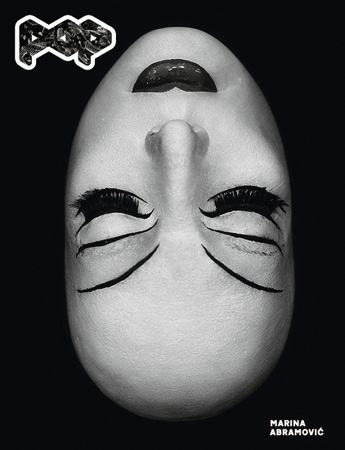
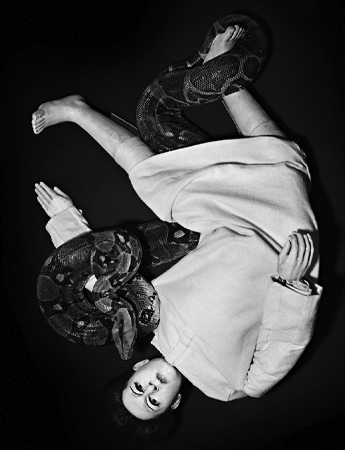 POP's Special edition Hardcover with Marina Abramović's death mask and "mini-me" wrestling with Daisy.
Photography by René Habermacher
POP's Special edition Hardcover with Marina Abramović's death mask and "mini-me" wrestling with Daisy.
Photography by René HabermacherMARINA CREDITS: Styling Isabelle Kountoure , Hair by Chi Wong at Julian Watson Agency using Shu Uemura Art of Hair, Make-up Yannis Siskos at Effex using Giorgio Armani Cosmetics, Photography Assistance Jonathan Flanders & Hannan Jones, Digital Remastering The Stimuleye, Snake Wrangler David Steward for Creature Feature, Production Lynsey Peisinger for The Stimuleye
FREJA CREDITS: Styling Isabelle Kountoure, Hair Peter Gray at The Collective using Shu Uemura Art of Hair, Make up Romy Soleimani at Management Artists, Manicure Tracelee Percival at Vue using Priti NYC, Model Freja Beha Erichsen at IMG New York, Casting Angus Munro at AM Casting, Streeters NY, Photography Assistance Cesar Rebollar, Fashion Assistance Jodie Latham, Stephanie Waknine, Rebecca Sammon & Michaela Dosamantes, Digital Technician Dilek Islidak, Digital Remastering The Stimuleye, Set Design Anne Koch at CLM NY, Production John Engstrom at Scheimpflüg Digital, Shot at Eagles Nest Daylight Studios NYC
